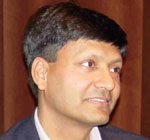Anu Garg | |
|---|---|
 | |
| Born | Anurag Garg April 5, 1967 |
| Occupation | Writer, speaker, columnist, software engineer |
| Genre | Non-fiction |
| Website | |
| wordsmith | |
Anu Garg (born April 5, 1967) is an American author and speaker. He is the founder of Wordsmith.org, an online community comprising aficionados of the English language from across 170 countries. [1] [2] His books explore the joy of words. He has authored several books about language-related issues and written for magazines and newspapers. He was a columnist for MSN Encarta and Kahani magazine. [3]